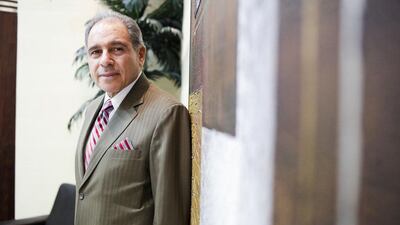ABU DHABI // Demand from students for more university courses to be taught in their native Arabic has sparked debate among academics, with some believing English is better for the country’s goal of becoming a knowledge-based economy.
Abu Dhabi University, the emirate’s largest private university, had, until now, taught all of its courses in English in line with the Ministry of Higher Education’s mandate.
However, it will offer subjects in Arabic for the first time in the coming academic year, including mass communications, which has only been running for two years.
Dr Nabil Ibrahim, ADU’s chancellor, said: “We started it in English two years ago and many of the students wanted to do it in Arabic, mainly because most newspapers here are in Arabic and most opportunities for employment consider a degree in Arabic of more value. This is certainly the case in Abu Dhabi, if not so much in Dubai.”
Dr Ibrahim said there were calls for more Arabic-taught subjects, particularly in the remote areas of the country.
“I can see lately that there is a lot more demand for complete programmes in Arabic, not just a few of the courses,” Dr Ibrahim said.
“This is certainly the case in areas like the Western Region where people go to Government schools and the dominant language is Arabic.”
However, Soha Shami, research associate at Al Qasimi Foundation for Policy Research in Ras Al Khaimah, argued against a switch to Arabic-only degrees.
Ms Shami said they would hinder the country’s progress, particularly with the UAE’s vision of becoming a knowledge economy and its Expo 2020 goals. “It’s important to be able to communicate with people at a high level in both Arabic and English, especially in areas such as mass communications,” she said.
“It’s the ability to have that balance, and Arabic-only programmes defeat the purpose of these goals like the knowledge economy.”
She said a bilingual approach would be more beneficial, both to students and the country.
“Personally speaking, I grew up bilingual and it was only at university that I started working with both languages. It’s such an asset in this region. Arabic is the official language but at the same time, you speak to people on a regular basis who come from other nationalities, especially in media and mass communications.
“It would be better to be bilingual than Arabic only, but, if not that, then we need to stick with English. Even if the numbers going into remedial English before university are still high, we need to address the global market.”
Dr Carol Moufarrey, associate dean of the Mohammed bin Rashid School of Communications at the American University of Dubai, which offers both an English-only and a dual language programme, said the mix was essential as Arabic-only was too limited.
Even for students who chose Arabic, only about 30 per cent of their work was in Arabic, with many courses, such as writing, submitted in English.
“From what I see, what we’re doing is the best mix,” Dr Moufarrey said. “There’s a big need for professionals with a mastery of the Arabic language so this mix is good. I wouldn’t recommend having a pure Arabic programme in any subject because most good faculty teach in English and the literature on most subjects is in English so you’d be depriving the students of all of that.”
She said the Arabic programme was added a year after the school was founded and had proved successful, but the students’ who enrolled must have a grasp of English similar to the English language programme track.
“The students really must be bilingual.”
mswan@thenational.ae

